The biggest story in baseball on Opening Day had zero to do with what was happening on the field (although the Yankees comeback win was pretty great!)
Instead, it was the controversy swirling around Los Angeles Dodgers super-duper star Shohei Ohtani and his former translator Ippei Mizuhara.
Here’s what we know: At least $4.5 million was wired from Ohtani’s bank account to a bookie in California, who is currently under federal investigation. Those gambling debts were reportedly wracked up by Mizuhara, who has been fired by the Dodgers.
“The Replay” is a passion project. I need your support and investment to keep it going! Subscriptions are just $5 a month or $50 for the entire year! Sign up today!
When the story initially broke last week, Mizuhara told ESPN that Ohtani had wired the money to cover Mizuhara’s debts. But, that story later changed — with the Ohtani side insisting he never knew about the money wired from his account, and that he had instead been the victim of a “massive theft” at the hands of Mizuhara.
Earlier this week, Ohtani spoke, briefly, about the scandal.
“Ippei has been stealing money from my account and has been telling lies,” Ohtani said Monday via an interpreter. “The first time I knew about Ippei's gambling was after the first game when we had the team meeting in the clubhouse.”
The story has gone quiet in the days since Ohtani spoke. But, it’s still all anyone in the baseball world is talking about. Ohtani is the biggest (and most marketable) star in the game — by a factor of 10. Any whiff of scandal around him presents a MAJOR problem for Major League Baseball.
We don’t have to guess at that fact. We KNOW it. Because sports and betting — and the conflicts they create — are nothing new. Below, a look at some of the biggest sports betting scandals of all time.
Did I miss one? Or several? Let me know in the comment section!
1. The Black Sox
When it comes to sports gambling scandals, this is the granddaddy of them all. (Hell, Hollywood made a movie out of it.)
The story goes like this: The Chicago White Sox were THE dominant team of the 1919 baseball season. They finished the year 88-52. They were led by “Shoeless” Joe Jackson, who hit .351 that year, and pitcher Eddie Cicotte, who won 29 games. They entered the World Series against the Cincinnati Reds as heavy favorites.
But, the Sox lost the series 5 games to 3. Which was, as we later learned, part of the plan. A group of Sox players, which included Cicotte, had agreed to throw the series in exchange for $100,000 paid out by a several high-profile gamblers.
After going down 4 games to 1 (it was an 8 game series back then), the Sox players allegedly decided to call off the deal — because they hadn’t been paid in full by the gamblers. But it was too late and they lost anyway.
Eight players — including Jackson, who admitted to accepting $5,000 from his teammates although not to tanking the series —were indicted. They were all eventually acquitted at trial when the paperwork that had sealed the agreement disappeared. (What a coincidence!)
Despite that acquittal, all 8 men were banned for life from the sport by Commissioner Kenesaw Mountain Landis.
2. Pete Rose
If the Black Sox are the first sports gambling scandal that most people know, Pete Rose betting on baseball is the second. (And, depending on your age, that order might be reversed.)
Rose was a longtime star for the Big Red Machine, the great Cincinnati Reds teams of the 1970s. In his 23 year career, he posted 4,256 hits —still the record in Major League Baseball. (And I cannot see how or when that record will be broken.)
After his playing days, Rose became the manager of the Reds. And that’s where the trouble started. In the spring of 1989, Sports Illustrated reported that Rose had placed a series of bets on baseball games — tracing it all back to an Ohio restaurant that the manager frequented and a friend of his named Paul Janszen.
Baseball Commissioner Bart Giamatti, in April 1989, opened up an official investigation into the allegations, which Rose vehemently denied, and appointed a man named John Dowd to lead it.
As the Sporting News wrote of Dowd’s investigation:
Dowd spoke with bookmakers and other runners claiming to be associated with Rose. Among those was Janszen, who detailed much of Rose's gambling network, including noting Rose lost $450,000 in a three-month span in 1987. Janszen claimed Rose said he would consider throwing a game if a large enough bet was placed on it, and said he'd check with managers before games to ask about the health of opposing players before placing bets on their teams.
"He would talk about his gambling in front of a lot of people. And his answer for that always was, 'They can't get me,'" Janszen said. "He put himself above everything. 'They can't get me,' he'd say. 'What have they got? What are they going to prove? How are they going to prove it?'"
Rose eventually filed his own suit to fight back against the charges. He and Giamatti entered into settlement talks that produced, on August 24, 1989, a five-page agreement signed by both men. Rose agreed to a lifetime ban from baseball but did not admit he had gambled on the game.
Rose remains banned — and current MLB Commissioner Rob Manfred said in 2023 that he has no plan to reverse that decision from Giamatti all those years ago.
“Pete Rose violated what is sort of rule one in baseball, and the consequences of that are clear in the rule, and we’ve continued to abide by our own rules,” Manfred said. “It’s just the rules are different for players. It’s part of the responsibility that comes with the privilege of being a major league player.”
3. Tim Donagy
As a general rule, the average sports fan has no idea who the refs of an NBA game are. Which is how it should be. The stars of the shows are the players on the court, not the men (and women) reffing the game.
But, Tim Donagy changed all of that — in the worst possible way.
In the mid 2000s, Donagy began betting on pro basketball games. As he wrote in his memoir: “When it came to pro basketball, I didn't need a roll of the dice, a flip of the coin, a spin of the wheel, a turn of the cards, or a Ouija board. All I needed was the NBA's daily Master List of Referees.”
Donagy would take money from professional gamblers in exchange for his insider tips. He said he never personally reffed to change the outcome of a game. “I didn't need to fix them,” he wrote. “I usually knew which team was going to win based on which referees had been assigned to the game, their personalities, and the relationships they had with the players and coaches of the teams involved.”
In 2008, Donagy was sentenced to 15 months of prison time for his illegal activities. (He served 11 months.)
Donagy made news in 2022 when he was interviewed for a documentary called “Operation Flagrant Foul” in which he alleged that refs are influenced by their personal feelings about players and discussed alleged league-wide mandates to get popular players or teams in prominent positions.
4. Paul Hornung and Alex Karras
In the early 1960s, Hornung (of the Green Bay Packers) and Karras (of the Detroit Lions) were two of the most famous football players in the NFL.
Hornung, a running back, had starred at Notre Dame, won the Heisman Trophy and been picked #1 in the NFL Draft. Karras won the Outland Trophy during his time at Iowa and was one of the best defensive players in the game.
Both men were suspended for the entire 1963 season by NFL Commissioner Pete Rozelle after admitting they had gambled on games.
On April 17, 1963, Rozelle announced the suspensions. Hornung’s penalty was for “his pattern of betting and transmission of specific information concerning NFL games for betting purposes.” Of Karras, Rozelle said that he had made at a half dozen bets on NFL games since 1958. (Five other Lions players were fined but not suspended for betting on games.)
Karras’ side of the story is the stuff of an old mobster movie. Shortly after entering the NFL, he had bought a stake in a local bar which allegedly was known to take sports bets. Karras admitted — on national TV! — that he had bet on games and dared Rozelle to suspend him.
“This is a real shock,” Karras told the Detroit Free Press after the suspension was announced. “I didn’t think it would be that bad. I’m still a bartender and I have a wrestling match coming up with Dick the Bruiser. From the sounds of Rozelle’s decision, I may be wrestling for the rest of my life.”
He did not, in fact, wrestle for the rest of his life. Both Karras and Hornung were reinstated for the 1964 season. Both men are now in the Pro Football Hall of Fame.
5. The New York college basketball point shaving scandal
This is the biggest sports betting scandal you have never heard of.
Consider the scope: 7 colleges and universities and 32 players — all of whom participated, in one way or another, in throwing basketball games.
At the center of it all was the City College of New York (CCNY), which was, in the late 1940s and early 1950s, a basketball powerhouse in the state. In 1950, the team won the National Invitational Tournament, beating the mighty University of Kentucky along the way.
Less than a year later, CCNY was disgraced. In February 1951, three CCNY players were arrested for taking money from gamblers as part of a point-shaving operation. (Four more CCNY players were ultimately arrested.)
The scandal spidered outward to take in players from Kentucky, Manhattan College, New York University and Long Island University — among others.
All told, the players fixed the outcomes of 86 games — still the most widespread example of point shaving ever recorded. CCNY was demoted to Division III and its basketball program never recovered. Kentucky was suspended for the 1952-1953 season but legendary coach Adolph Rupp remained at the helm for another 20 years.
As the City Journal wrote in a 2017 piece:
The scandal nearly destroyed big-time college basketball in New York. Promoters struggled to attract top teams to play in Gotham, and the NCAA tournament permanently surpassed the New York–centric NIT in importance. Among the city’s top basketball schools, only St. John’s survived as a national force.

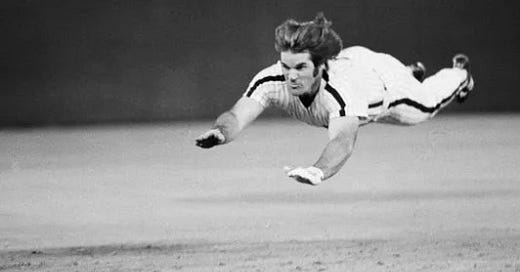


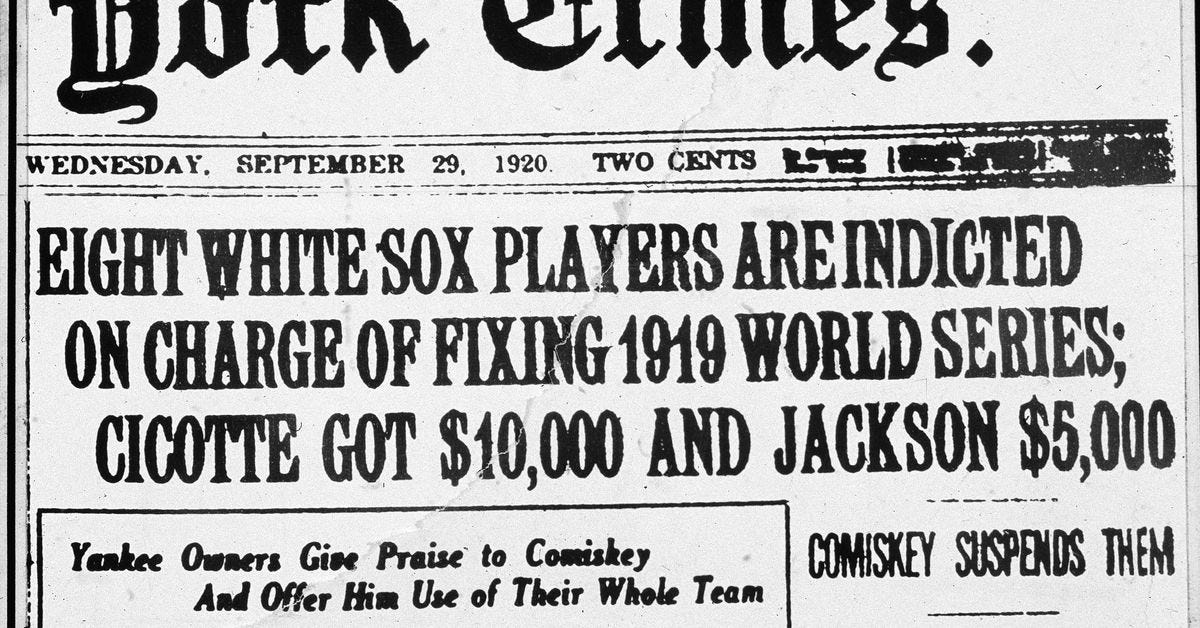
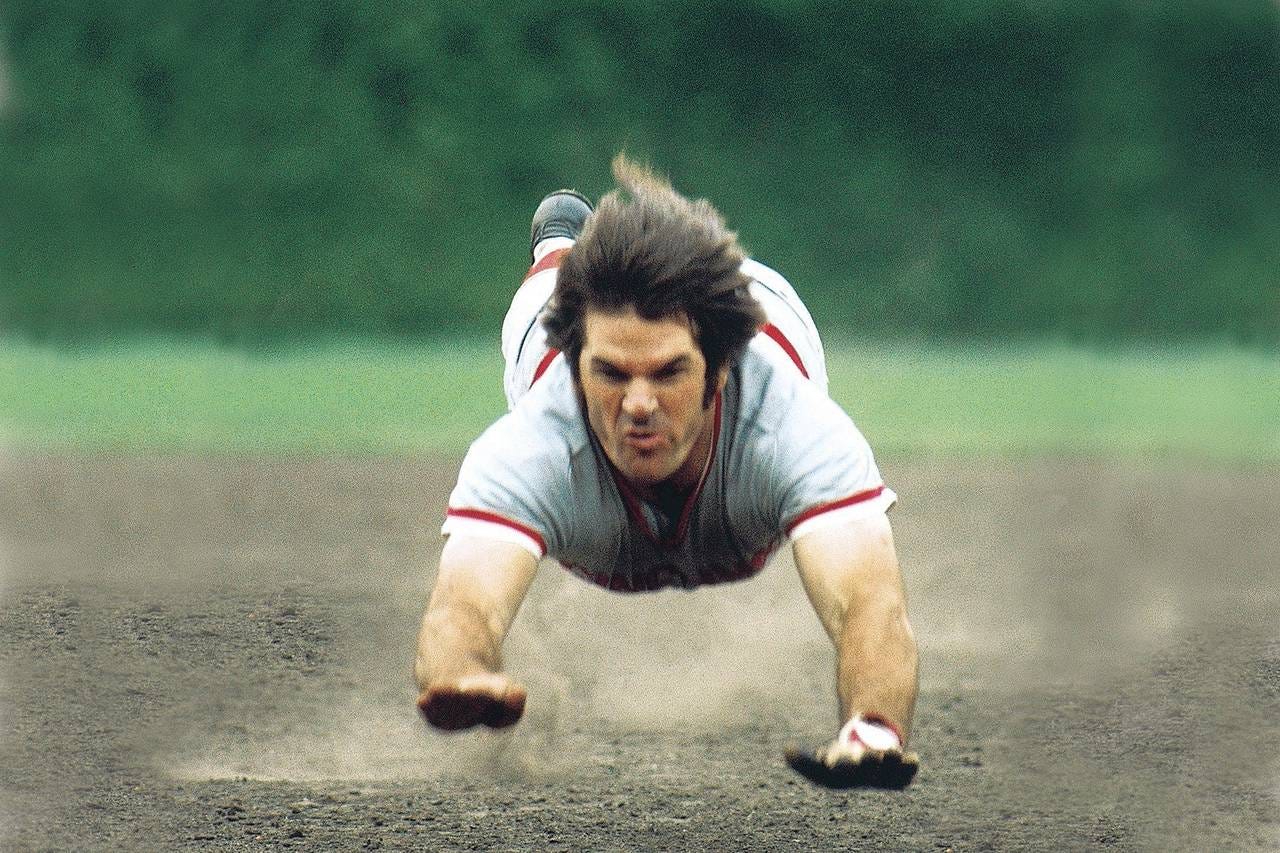
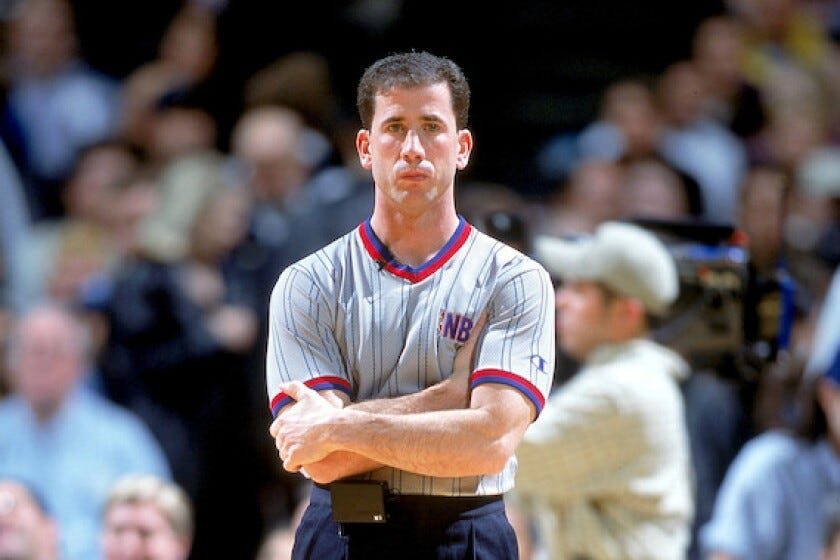
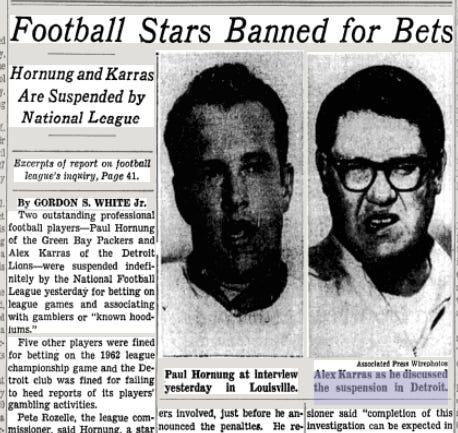
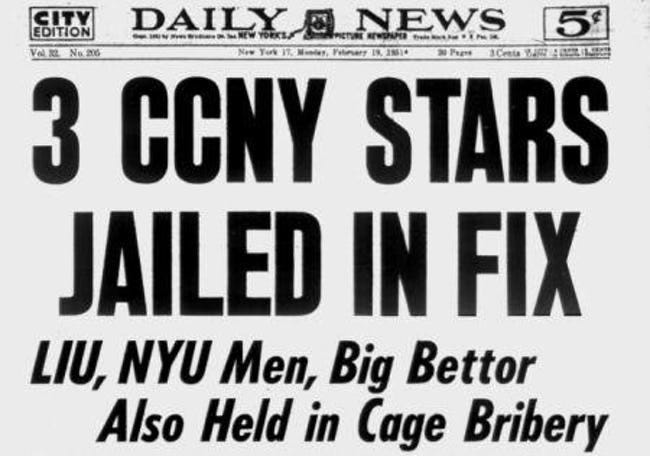
There is a new book out about Pete Rose called “Charlie Hustle, the rise and fall of Pete Rose” by Keith O’Brien. I heard him on Richard Deitsch’s sports media podcast. As a Reds fan I will be reading this one.
Love the new sports themed feed Chris!
Honorable mention: Hot Rod Williams et al at Tulane